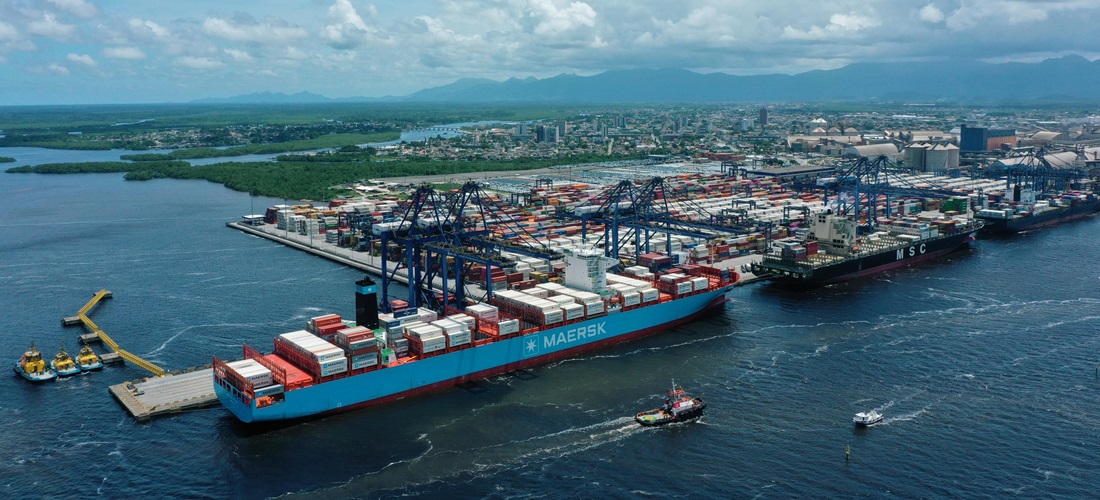
TCP Sees 22% Surge in Beef Exports
Mar, 26, 2025 Posted by Gabriel MalheirosWeek 202513
Beef exports handled at Paranaguá Container Terminal rose 22% in the first two months of 2025, reaching 123,000 tonnes shipped in 4,483 containers. This growth far outpaces the national average for the sector, which, according to the Brazilian Beef Exporters Association (ABIEC), saw a 4.7% increase in volume over the same period. In total, Brazil shipped 428,000 tonnes of beef, generating a 13.9% rise in revenue to R$2.045 billion.
Giovanni Guidolim, TCP’s commercial, logistics, and customer service manager, attributes the strong performance to the terminal’s operational reliability and infrastructure. “TCP is a benchmark in service and specialized solutions for meat exporters. With the completion of South America’s largest reefer container yard, coupled with a normalized yard occupancy rate and an efficient appointment system for cargo delivery and pickup, we started 2025 expanding our customer base and strengthening our market share in the meat and frozen goods segment,” he said.
In addition to the rise in beef shipments, TCP remains the world’s largest export gateway for frozen chicken. In the first two months of 2025, the terminal handled 382,000 tonnes of chicken meat, accounting for 42% of Brazil’s total poultry exports. According to data from the Brazilian Animal Protein Association (ABPA), Brazil exported 911,000 tonnes of chicken meat during this period, generating US$1.696 billion in revenue—a 22% increase compared to the previous year.
Paraná, the country’s largest poultry-producing state, alone shipped 186,000 tonnes in the first two months of the year. Guidolim highlighted TCP’s strong ties with local industry, emphasizing that this synergy ensures maximum efficiency for exporters using the terminal. “Our rail connection links northern and western Paraná directly to the terminal’s bonded yard, making it a strategic option for exporters in these regions who seek operational reliability when shipping poultry,” he noted.
Between January and February, exports of beef, poultry, pork, and other frozen goods through TCP totaled 545,000 tonnes, transported in 20,035 containers. As a result, the terminal holds a 40.1% market share in the meat and frozen cargo segment compared to ports in neighboring states such as São Paulo and Santa Catarina.
In June 2024, TCP completed the expansion of its reefer yard, significantly increasing its refrigerated container storage capacity. The project boosted the number of reefer plugs by 45%, from 3,624 to 5,268, making the Paranaguá Container Terminal home to the largest reefer yard in South America.
The chart below shows the upward trajectory of beef exports recorded at Brazil’s Paranagua Port from January 2021 to January 2025, according to data from DataLiner.
Beef Exports | Paranaguá Port | Jan 2021 – Jan 2025 | TEUs
Source: DataLiner (click here to request a demo)
New Market Access Fuels Growth in Brazil’s Meat and Frozen Goods Sector
Brazil’s meat and frozen goods sector is undergoing significant international expansion, driven by increased access to new markets. In February 2025, Mexico saw a 41% surge in Brazilian beef imports compared to January, reaching 4,421 tonnes. This uptick is part of a broader trend, with Brazil having secured access to over 20 new markets for its meat exports since 2023.
To support this growth, TCP offers eight direct shipping services to Asia, along with extensive coverage in Central America and the Caribbean. The terminal’s infrastructure ensures efficient connections to key markets such as Japan, Singapore, and Mexico.
“We are the Brazilian terminal with the highest concentration of shipping services. This broad network, coupled with our high frequency of port calls—25 sailings per week—provides our customers with logistics flexibility and reliable scheduling, which is essential for exporters meeting strict delivery deadlines,” explained Carolina Merkle Brown, TCP’s liner services manager.
The surge in exports also reflects expanded access to countries with historically stringent sanitary regulations. In 2023, Japan approved imports of canned beef, while Israel opened its market to Brazilian poultry. By 2024, Panama and El Salvador had begun importing Brazilian poultry meat and offal, further broadening the reach of the country’s protein exports. Meanwhile, outbreaks of H5N1 avian influenza in countries like the United States have disrupted global chicken meat supplies, positioning Brazil as a key alternative supplier.
Against this backdrop, expectations are high for Brazilian meat and frozen goods exports to exceed 2025 projections. “Our specialized service, combined with benefits such as seven days of free storage for exporters, positions TCP as a strategic partner for the sector,” Guidolim concluded.
-
Grains
Jun, 19, 2023
0
Brazilian agribusiness strikes record high exports in May
-
Other Cargo
Apr, 15, 2021
0
Cotton exports set a new record in the first quarter
-
Meat
Jun, 13, 2022
0
Industrial, small-scale fishing rank high among Rio Grande do Norte exports
-
Shipping
Nov, 06, 2024
0
Shipping reacts to Trump election win

